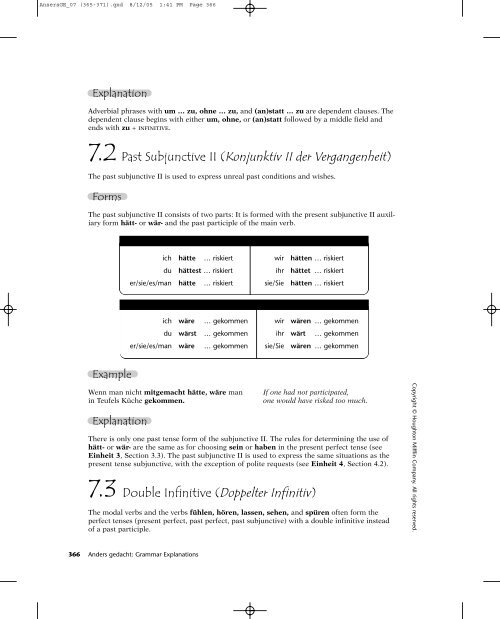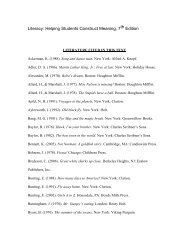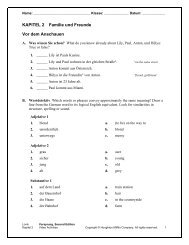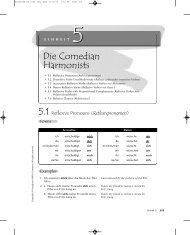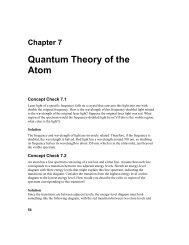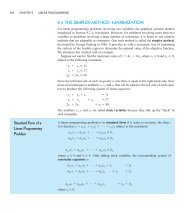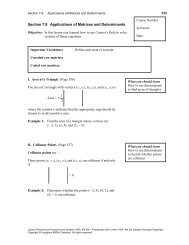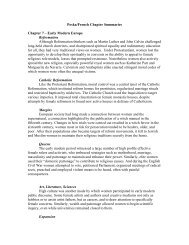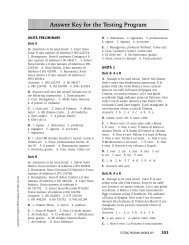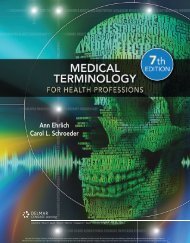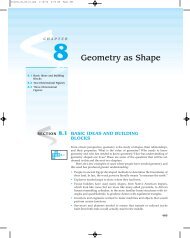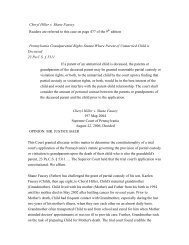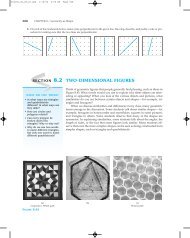(an)statt
(an)statt
(an)statt
You also want an ePaper? Increase the reach of your titles
YUMPU automatically turns print PDFs into web optimized ePapers that Google loves.
AnsersGE_07 (365-371).qxd 8/12/05 1:41 PM Page 366<br />
Expl<strong>an</strong>ation<br />
Adverbial phrases with um … zu, ohne … zu, <strong>an</strong>d (<strong>an</strong>)<strong>statt</strong> … zu are dependent clauses. The<br />
dependent clause begins with either um, ohne, or (<strong>an</strong>)<strong>statt</strong> followed by a middle field <strong>an</strong>d<br />
ends with zu + INFINITIVE.<br />
7.2 Past Subjunctive II (Konjunktiv II der Verg<strong>an</strong>genheit)<br />
The past subjunctive II is used to express unreal past conditions <strong>an</strong>d wishes.<br />
Forms<br />
The past subjunctive II consists of two parts: It is formed with the present subjunctive II auxiliary<br />
form hätt- or wär- <strong>an</strong>d the past participle of the main verb.<br />
ich hätte … riskiert wir hätten … riskiert<br />
du hättest … riskiert<br />
ihr hättet … riskiert<br />
er/sie/es/m<strong>an</strong> hätte … riskiert sie/Sie hätten … riskiert<br />
ich wäre … gekommen wir wären … gekommen<br />
du wärst … gekommen ihr wärt … gekommen<br />
er/sie/es/m<strong>an</strong> wäre … gekommen sie/Sie wären … gekommen<br />
Example<br />
Wenn m<strong>an</strong> nicht mitgemacht hätte, wäre m<strong>an</strong><br />
in Teufels Küche gekommen.<br />
Expl<strong>an</strong>ation<br />
If one had not participated,<br />
one would have risked too much.<br />
There is only one past tense form of the subjunctive II. The rules for determining the use of<br />
hätt- or wär- are the same as for choosing sein or haben in the present perfect tense (see<br />
Einheit 3, Section 3.3). The past subjunctive II is used to express the same situations as the<br />
present tense subjunctive, with the exception of polite requests (see Einheit 4, Section 4.2).<br />
7.3 Double Infinitive (Doppelter Infinitiv)<br />
The modal verbs <strong>an</strong>d the verbs fühlen, hören, lassen, sehen, <strong>an</strong>d spüren often form the<br />
perfect tenses (present perfect, past perfect, past subjunctive) with a double infinitive instead<br />
of a past participle.<br />
Copyright © Houghton Mifflin Comp<strong>an</strong>y. All rights reserved.<br />
366 Anders gedacht: Grammar Expl<strong>an</strong>ations


